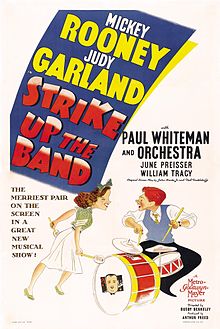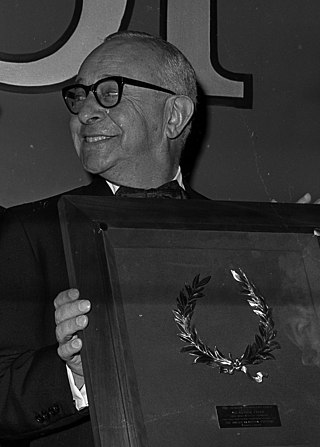
Arthur Freed was an American lyricist and a Hollywood film producer. He won the Academy Award for Best Picture twice, in 1951 for An American in Paris and in 1958 for Gigi. Both films were musicals, and both were directed by Vincente Minnelli. In addition, he produced the film Singin' in the Rain, the soundtrack for which primarily consisted of songs he co-wrote earlier in his career.

That's Entertainment! is a 1974 American compilation film released by Metro-Goldwyn-Mayer to celebrate the studio's 50th anniversary. The success of the retrospective prompted a 1976 sequel, the related 1985 film That's Dancing!, and a third installment in 1994.
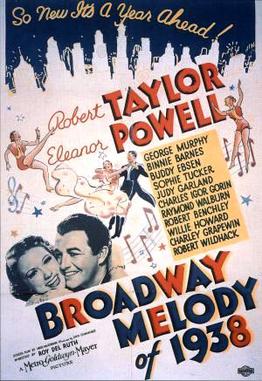
Broadway Melody of 1938 is a 1937 American musical film produced by Metro-Goldwyn-Mayer and directed by Roy Del Ruth. The film is essentially a backstage musical revue, featuring high-budget sets and cinematography in the MGM musical tradition. The film stars Eleanor Powell and Robert Taylor and features Buddy Ebsen, George Murphy, Judy Garland, Sophie Tucker, Raymond Walburn, Robert Benchley and Binnie Barnes.

Babes on Broadway is a 1941 American musical film starring Mickey Rooney and Judy Garland and directed by Busby Berkeley, with Vincente Minnelli directing Garland's big solo numbers. The film, which features Fay Bainter and Virginia Weidler, was the third in the "Backyard Musical" series about kids who put on their own show, following Babes in Arms (1939) and Strike Up the Band (1940). Songs in the film include "Babes on Broadway" by Burton Lane (music) and E.Y. "Yip" Harburg (lyrics), and "How About You?" by Lane with lyrics by Ralph Freed, the brother of producer Arthur Freed. The movie ends with a minstrel show performed by the main cast in blackface.
Roger Edens was a Hollywood composer, arranger and associate producer, and is considered one of the major creative figures in Arthur Freed's musical film production unit at Metro-Goldwyn-Mayer during the "golden era of Hollywood".

Ziegfeld Follies is a 1945 American musical comedy film released by Metro-Goldwyn-Mayer, primarily directed by Vincente Minnelli, with segments directed by Lemuel Ayers, Roy Del Ruth, Robert Lewis, and George Sidney, the film's original director before Minnelli took over. Other directors that are claimed to have made uncredited contributions to the film are Merrill Pye, Norman Taurog, and Charles Walters. It stars many MGM leading talents, including Fred Astaire, Lucille Ball, Lucille Bremer, Fanny Brice, Judy Garland, Kathryn Grayson, Lena Horne, Gene Kelly, James Melton, Victor Moore, William Powell, Red Skelton, and Esther Williams.
Show Boat is a 1936 American romantic musical film directed by James Whale, based on the 1927 musical of the same name by Jerome Kern and Oscar Hammerstein II, which in turn was adapted from the 1926 novel of the same name by Edna Ferber.

Summer Stock is a 1950 American Technicolor musical film produced by Metro-Goldwyn-Mayer. It was directed by Charles Walters, stars Judy Garland and Gene Kelly, and features Eddie Bracken, Gloria DeHaven, Marjorie Main, and Phil Silvers. Musical numbers were staged by Nick Castle and Kelly.

Till The Clouds Roll By is a 1946 American Technicolor musical film produced by Metro-Goldwyn-Mayer and a fictionalized biopic of composer Jerome Kern, portrayed by Robert Walker. Kern was involved with the production, but died before its completion. It was the first in a series of MGM biopics about Broadway composers.

Born to Dance is a 1936 American musical film directed by Roy Del Ruth and starring Eleanor Powell, James Stewart and Virginia Bruce. It was produced and distributed by Metro-Goldwyn-Mayer. The score was composed by Cole Porter.
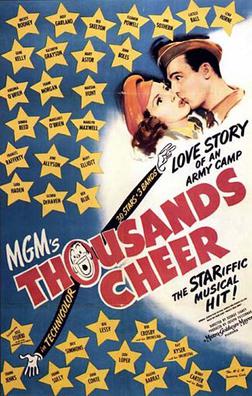
Thousands Cheer is a 1943 American musical comedy film directed by George Sidney and released by Metro-Goldwyn-Mayer. Produced during the Second World War, the film was intended as a morale booster for American troops and their families.

For Me and My Gal is a 1942 American musical film directed by Busby Berkeley, and starring Judy Garland, George Murphy, Martha Eggerth, Ben Blue and Gene Kelly in his film debut. The film was written by Richard Sherman, Fred F. Finklehoffe and Sid Silvers, based on a story by Howard Emmett Rogers inspired by a true story about vaudeville actors Harry Palmer and Jo Hayden, when Palmer was drafted into World War I. The film was a production of the Arthur Freed unit at MGM.

Babes in Arms is the 1939 American film version of the 1937 coming-of-age Broadway musical of the same title. Directed by Busby Berkeley, it stars Mickey Rooney and Judy Garland, and features Charles Winninger, Guy Kibbee, June Preisser, Grace Hayes, and Betty Jaynes. It was Garland and Rooney's second film together as lead characters after their earlier successful pairing in the fourth of the Andy Hardy films. The film concerns a group of youngsters trying to put on a show to prove their vaudevillian parents wrong and make it to Broadway. The original Broadway script was significantly revamped, restructured, and rewritten to accommodate Hollywood's needs. Almost all of the Rodgers and Hart songs from the Broadway musical were discarded.
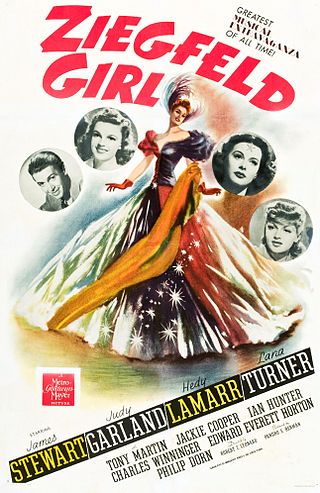
Ziegfeld Girl is a 1941 American musical film directed by Robert Z. Leonard and starring James Stewart, Judy Garland, Hedy Lamarr, Lana Turner, Tony Martin, Jackie Cooper, Eve Arden, and Philip Dorn. The film, which features musical numbers by Busby Berkeley, was produced by Metro-Goldwyn-Mayer.

Good News is a 1947 American Metro-Goldwyn-Mayer musical film based on the 1927 stage production of the same name. It starred June Allyson, Peter Lawford, Mel Tormé, and Joan McCracken. The screenplay by Betty Comden and Adolph Green was directed by Charles Walters in Technicolor.
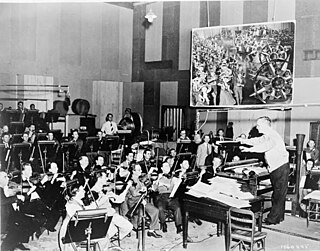
The songs from the 1939 musical fantasy film The Wizard of Oz have taken their place among the most famous and instantly recognizable American songs of all time, and the film's principal song, "Over the Rainbow", is perhaps the most famous song ever written for a film. Music and lyrics were by Harold Arlen and E.Y. "Yip" Harburg, who won an Academy Award for Best Song for "Over the Rainbow."
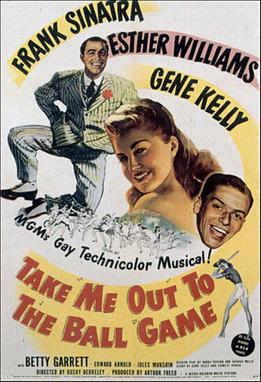
Take Me Out to the Ball Game is a 1949 American Technicolor musical film produced in the Arthur Freed unit of MGM. It stars Frank Sinatra, Esther Williams, Gene Kelly, Betty Garrett, Edward Arnold and Jules Munshin, and was directed by Busby Berkeley. The title and nominal theme is taken from the unofficial anthem of American baseball, "Take Me Out to the Ball Game." The film was released in the United Kingdom as Everybody's Cheering.

Girl Crazy is a 1943 American musical film starring Judy Garland and Mickey Rooney. Produced by the Freed Unit of Metro-Goldwyn-Mayer, it is based on the stage musical Girl Crazy – which was written by Guy Bolton and Jack McGowan, with music and lyrics by George and Ira Gershwin. It was the last of Garland and Rooney's nine movies as co-stars, the pair appearing only once more together on film, as guest stars in 1948's Words and Music.

Lord Byron of Broadway (1930), also known as What Price Melody?, is an American Pre-Code musical drama film, directed by Harry Beaumont and William Nigh. It was based on a best selling book by Nell Martin, which "was widely praised by critics as an extremely true and amusing romance of stage life." It was filmed in black and white with two-color Technicolor sequences.

The Hard Way is a 1943 Warner Bros. musical drama film starring Ida Lupino, Dennis Morgan, and Joan Leslie. Directed by Vincent Sherman, it is based on a story by Irwin Shaw which was reportedly based on Ginger Rogers' relationship with her first husband Jack Pepper and her mother Lela.
